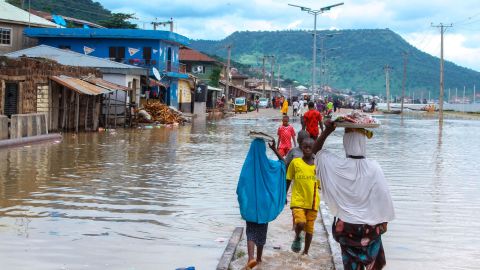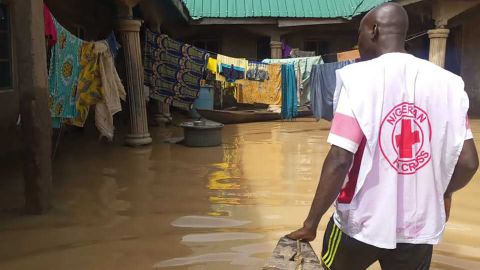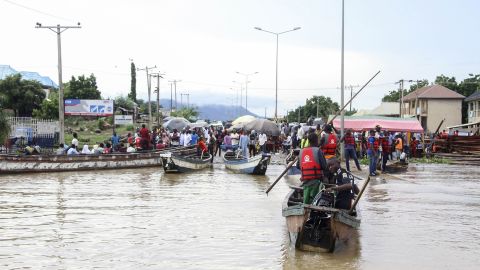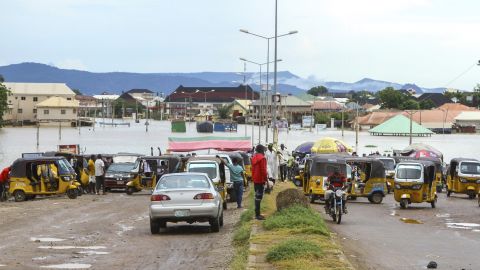Abuja, Nigeria
CNN
—
Seventy-six people have died as their boat capsized while they tried to flee dangerously high floodwaters that have inundated swathes of southern Nigeria.
The boat, carrying more than 80 people, capsized in the southeastern state of Anambra on Friday, as people desperately tried to escape floods that had risen as high as rooftops.
Recent flooding in the area had displaced up to 600,000 people, according to the country’s National Emergency Management Agency (NEMA).

Nigeria’s flood crisis has been disastrous this year, killing at least 300 people and affecting more than half a million people, NEMA said last month. NEMA warned of more catastrophic flooding for states located along the courses of rivers Niger and Benue, explaining that three of Nigeria’s overfilled reservoirs were expected to overflow.
The Anambra tragedy follows the devastating aftermath of a flood that swept through swaths of neighboring north-central Kogi state a week ago, leaving buildings submerged under water that rose to levels not seen in a decade, according to officials of the Kogi Red Cross Society.
At least six people, including a toddler, were reported to have died in Kogi’s worst-hit Ibaji district, which the state Governor Yahaya Bello said was “100% underwater.”
Bello described the flooding as a “humanitarian tragedy” in an October 1 address.
Kogi is located around 200 kilometers from Nigeria’s capital, Abuja. Kogi’s capital, Lokoja, is the meeting point for West Africa’s largest rivers, the Niger and Benue.
“As the two major rivers meet in Lokoja, they overwhelmed the banks of the Lower Niger river, hence the inundation,” environmentalist Simi Adeodun told CNN.
“Not only Lokoja is inundated right now, but most of the riparian communities along the fringes of River Benue in Nasarawa State … and River Niger traversing the boundary between Kwara and Niger states are also submerged.” he said.

The Kogi Red Cross Society said: “Many people have been rendered homeless in Lokoja … as houses were submerged by flood,” adding that some major roads in the capital city had been submerged.
“The roads served as a link between North Central and Southern parts of the country,” it said. “And many passengers were stranded.”
The Red Cross told CNN some of the deceased in Ibaji also lost their lives in a separate boat accident as they canoed through flood waters.
Bello said that nine areas along the Niger and Benue were affected.
“Ibaji [district] is almost 100% under water while the rest range from 30% up … We therefore have a serious and humanitarian tragedy on our hands, but I wish to assure every person, family and community which has been affected that they are not alone and that help is coming,” he said.
Some travelers said they were trapped for more than a day in flooded areas.
Okeke Grace Eche told CNN of her experience traveling from Lokoja to Abuja at the height of the flooding on October 3.
“It was the most terrifying two nights of my life,” she says of a two-day ordeal for a trip that would normally take only a few hours.
Eche arrived at Lokoja at 4 pm on Monday (October 3), and told CNN she “noticed a long queue of trailers, and vans conveying heavy equipment and animals.”
“I had hoped that it was normal traffic caused by a fallen trailer but we were not ready for the nights that followed,” she said.
“I spent my first night in the middle of bushes … I saw first-hand, houses, filling stations, vast land submerged, women, children, and their husbands building makeshift paper bag houses along the road,” she told CNN.
In many parts of the north-central state, locals are taxiing across their flooded communities in canoes.
Abdullahi Abubakar, an official of the Red Cross in Kogi is worried that the use of canoes may lead to more fatal accidents.
“It is dangerous, especially for those who don’t know how to swim,” Abubakar told CNN.
Abubakar said many displaced people were taking shelter in the homes of relatives and good Samaritans in neighboring towns unaffected by the flood, which he added was gradually receding.
Kogi Governor Bello, who visited ravaged communities by canoe, said he was working to reduce the impact of the flood while urging those affected to relocate to designated camps for displaced persons in the state.

According to NEMA, the release of excess water from a dam in neighboring Cameroon was bound to “complicate”” Nigeria’s already disastrous flood crisis.
“The Lagdo dam operators in the Republic of Cameroun have commenced the release of excess water from the reservoir by 13th September, 2022. We are aware that the released water cascades down to Nigeria through River Benue and its tributaries thereby inundating communities that have already been impacted by heavy precipitation,” NEMA said in a statement on September 19.
“The released water complicates the situation further downstream as Nigeria’s inland reservoirs … are also expected to overflow between now and October ending,” it stated, adding that: “This will have serious consequences on frontline states and communities along the courses of rivers Niger and Benue.”
Kogi and Anambra were among 13 Nigerian states predicted to be overrun by “the combined waters of rivers Niger and Benue as they empty into the region,” NEMA said.
Many communities in Kogi are now underwater.

Flooding in Kogi this year had a more severe impact on communities than what was recorded during the last major flooding in 2012, Abubakar told CNN.
According to Nigeria’s National Inland Waterways Authority, the 2012 flood rose to the level of 12.84 meters while the latest flooding was gauged at 13.22 meters.
But Kogi is not the only state reeling from the devastating impact of the latest flood.
In neighboring Nasarawa state, which is also grappling with flood water cascading down the River Benue, farmers are counting their losses from ravaged farmlands.
In northeastern Adamawa, more people are dying from flood-related incidents, NEMA said. Around 37 people have died during the current rainy season and more than 170,000 displaced, the agency stated.
Many parts of Nigeria are prone to yearly floods with coastal cities like Lagos even more vulnerable to seasonal flooding.
Climate activists are intensifying the call for climate finance to address Nigeria’s climate crisis.
Nigerian authorities are heeding this call as the country joins its African counterparts to seek an expansion of climate financing ahead of next month’s COP27 climate summit in Egypt.

